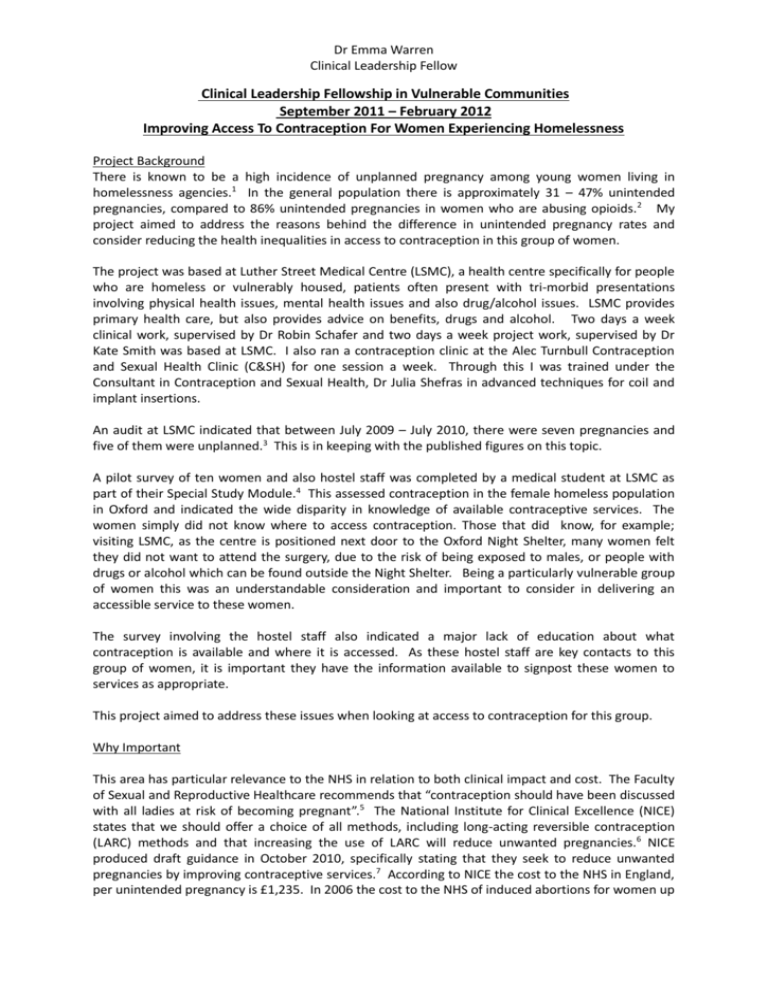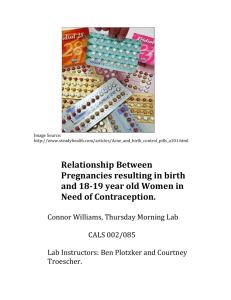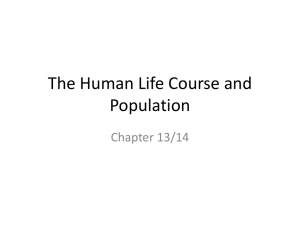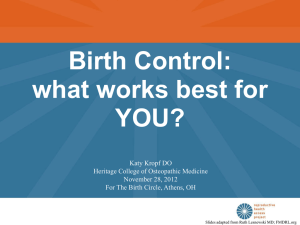
Dr Emma Warren
Clinical Leadership Fellow
Clinical Leadership Fellowship in Vulnerable Communities
September 2011 – February 2012
Improving Access To Contraception For Women Experiencing Homelessness
Project Background
There is known to be a high incidence of unplanned pregnancy among young women living in
homelessness agencies.1 In the general population there is approximately 31 – 47% unintended
pregnancies, compared to 86% unintended pregnancies in women who are abusing opioids.2 My
project aimed to address the reasons behind the difference in unintended pregnancy rates and
consider reducing the health inequalities in access to contraception in this group of women.
The project was based at Luther Street Medical Centre (LSMC), a health centre specifically for people
who are homeless or vulnerably housed, patients often present with tri-morbid presentations
involving physical health issues, mental health issues and also drug/alcohol issues. LSMC provides
primary health care, but also provides advice on benefits, drugs and alcohol. Two days a week
clinical work, supervised by Dr Robin Schafer and two days a week project work, supervised by Dr
Kate Smith was based at LSMC. I also ran a contraception clinic at the Alec Turnbull Contraception
and Sexual Health Clinic (C&SH) for one session a week. Through this I was trained under the
Consultant in Contraception and Sexual Health, Dr Julia Shefras in advanced techniques for coil and
implant insertions.
An audit at LSMC indicated that between July 2009 – July 2010, there were seven pregnancies and
five of them were unplanned.3 This is in keeping with the published figures on this topic.
A pilot survey of ten women and also hostel staff was completed by a medical student at LSMC as
part of their Special Study Module.4 This assessed contraception in the female homeless population
in Oxford and indicated the wide disparity in knowledge of available contraceptive services. The
women simply did not know where to access contraception. Those that did know, for example;
visiting LSMC, as the centre is positioned next door to the Oxford Night Shelter, many women felt
they did not want to attend the surgery, due to the risk of being exposed to males, or people with
drugs or alcohol which can be found outside the Night Shelter. Being a particularly vulnerable group
of women this was an understandable consideration and important to consider in delivering an
accessible service to these women.
The survey involving the hostel staff also indicated a major lack of education about what
contraception is available and where it is accessed. As these hostel staff are key contacts to this
group of women, it is important they have the information available to signpost these women to
services as appropriate.
This project aimed to address these issues when looking at access to contraception for this group.
Why Important
This area has particular relevance to the NHS in relation to both clinical impact and cost. The Faculty
of Sexual and Reproductive Healthcare recommends that “contraception should have been discussed
with all ladies at risk of becoming pregnant”.5 The National Institute for Clinical Excellence (NICE)
states that we should offer a choice of all methods, including long-acting reversible contraception
(LARC) methods and that increasing the use of LARC will reduce unwanted pregnancies.6 NICE
produced draft guidance in October 2010, specifically stating that they seek to reduce unwanted
pregnancies by improving contraceptive services.7 According to NICE the cost to the NHS in England,
per unintended pregnancy is £1,235. In 2006 the cost to the NHS of induced abortions for women up
Dr Emma Warren
Clinical Leadership Fellow
to the age of 25 was £48,680,949.7 With this particular patient group many of the women will
continue with the pregnancy, then often the child is taken into care, it is difficult to estimate the
great costs monetarily and the societal costs of having a child in care.
This project also addresses ‘Ambition six’ in the ten year priorities outlined for NHS healthcare across
South Central in the ‘Towards a Healthier Future’ vision. Ambition 6: “Support patients in exercising
choice by providing better access to clinical and other information to help them make decisions that
will achieve the best care and outcome for them”.8
Project Aims
-
Develop a sustainable outreach service for contraception education within this patient group
and hostel staff
Develop a pocket information leaflet signposting contraceptive services for people
experiencing homelessness within Oxford City
Develop project management and leadership skills
Develop specialist interest GP skills in Women’s Health, substance misuse and medicine for
people experiencing homelessness
Project Outcomes
1) Contraception Signposting Drop in Service
Based on the survey results that many women were not accessing contraception services due to
issues with where the service is located. I decided to think differently and take the service to them!
After negotiations with the nursing manager at LSMC and networking with local agencies working
with women with drug and alcohol issues, it was agreed to release one of the practice nurses from
LSMC for two hours on a monthly basis to attend local hostels with the ‘Women’s Service’. This
service was already running a weekly drop in at two of the hostels, thus the nurses would join them
to undertake a drop in once a month to signpost to contraceptive services, educate women on the
different methods and provide condoms. Working with the Women’s service enables the nurses to
maximise their chances of reaching their target audience. This is an excellent example of innovative
partnership working. The sustainability to this element of the project is achieved by the nurses
running the drop in, not myself, thus it will continue after my project placement finishes. I have
supported the nurses in setting up the drop in service, liaison work with the hostels and Women’s
service and also advertising the service. The first drop in occurred on February 23 rd 2012 and three
patients were seen, including one male! Two of the females are known to LSMC as being very
chaotic and not accessing our service for contraception, thus it is a fantastic outcome that they felt
they could access the nurses at the hostel. This then builds trust for them to then access appropriate
contraceptive services as needed in the future. This will initially be piloted for six months, but from
experience in this area even if initial numbers attending are low, persistence and the nurses turning
up regularly, so the patients get to recognise a familiar face, is what will help to make this drop in a
success.
2) Condom Distribution and Training
During my project work and liaison work with the homeless agencies, I highlighted a need that some
agencies did not have access to a supply of condoms. I addressed this need through my contacts
made with the Primary Care Trust (PCT) and Council as part of my project, enabling two hostels; Two
Saints and One Foot Forward and a service that supports clients into second stage housing; Julian
Housing, to now receive condoms as distributed regularly by the PCT. The under 25 hostel, One Foot
Forward, also joined the ‘Safety Card Scheme’ whereby they receive training on educating young
Dr Emma Warren
Clinical Leadership Fellow
people under age 18 on the correct use of condoms and also receive a supply of condoms for this
age group. This was such a basic necessity, but easily addressed by linking the agency staff with my
contacts at the PCT and Council.
3) Contraception Educational Workshop For Hostel Staff
I held a workshop on contraception for hostel staff and agencies working with people experiencing
homelessness. It was attended by eight members of staff from various hostels and homelessness
agencies and aimed to address basic knowledge on the available methods of contraception, where
they can be accessed and pertinent issues relevant to this patient group in relation to contraception
and drug/alcohol/liver issues. The feedback was very positive with 70% of attendees rating that all
the objectives had been met. Also 70% of attendees noted that it would directly affect them doing
something differently, for the majority this was raising this topic area with their clients and for some
even looking to change their practice to incorporate this topic area into their support plans.
4) Commissioning Educational Provision for Hostel Staff
My contact with the Lead Consultant in Genito-urinary Medicine, Dr Jackie Sherrard, and
emphasising the lack of educational provision for the hostel staff, led to her suggesting that her
health advisors could take on the role of continuing to deliver this sexual health education for hostel
staff after my project placement finishes. Donna Husband, from the PCT will be looking into
provision to commission this in future to ensure sustainability of this important requirement.
5) Contraceptive Signposting in Resettlement Interviews
Highlighting this vital area through my project liaison work and generally raising awareness of this
topic and also directly through my educational workshop, has brought about change to the format of
the resettlement interviews at the Night Shelter. They are now incorporating a question on
knowledge of access to contraception into their resettlement interview.
6) Information Leaflet
I designed and developed a leaflet that can be folded into a credit card size, to signpost contraceptive
services for people experiencing homelessness in Oxford city, including access to condoms from
some of the hostels. This leaflet has been produced in draft and is being distributed by the Night
Shelter, by the Women’s Service in their Women’s Initiative on Street Health (WISH) packs, at the
contraception drop ins at the hostel and at LSMC. I am in the process of sourcing continuing funding
for the printing of further leaflets. These will be modified for full printing after the first week of April,
when the changes to the drug and alcohol services and the Women’s service will then be known and
finalised.
7) Specialist Interest GP Skills
My work at the C&SH has enabled me to develop specialist skills in insertions and removals of coils
and implants. My clinical work at LSMC has facilitated my growth in managing complex patient
consultations, taught me to utilise motivational interviewing techniques, management of substance
misuse issues, including experience in substitute prescribing and community alcohol detoxes. This
has shaped my future career path as I would like to further progress these skills in my proposed
portfolio career, so will be looking for jobs where I can maximise use of these skills.
8) Teaching, Training and Presentation Skills
Through direct teaching of medical students, GP trainees and multi-agency staff in my workshop and
Big Issue Health Week work and presentations of my project outcomes to LSMC and the Sexual
Health Network for Oxford, I have enhanced how I deliver appropriate teaching and presentations
Dr Emma Warren
Clinical Leadership Fellow
for the audience I am delivering to. This is an incredibly useful and transferable skill to my future
work in General Practice.
Key Lessons Learned
The importance of networking and getting face-to-face contact with all the agencies I have been
working with on this project. As the project progressed, these contacts and relationships I nurtured
opened doors to certain aspects of development of the project. Additionally they made change
management easier to deliver as I was a known entity.
This was definitely key to my project
management and to facilitate the changes that were required.
Joint working has maximised the impact of this project and has also provided the sustainability for
aspects of the project work to continue in the future.
Patience has been a real virtue, when the inertia to change has been great. I have had to be flexible
in my approach to manage challenges that arose during my project management. This has
emphasised that I have key skills, especially in communication, negotiation and empathy to change,
to take forward in my future leadership work.
Future Actions
1) Evidence from this project that education for hostel staff and homelessness agencies on this
topic area is key to enable them to confidently signpost patients to services and raising
awareness of this issue generally. Thus, a recommendation for the PCT to commission
Contraception educational provision for hostel staff and homelessness agencies. The GUM
health advisors have already been nominated to provide this.
2) Finalise the leaflet for full printing when the change in services has been confirmed after the
first week in April and funding has been sourced.
3) LSMC to re-audit their pregnancy data, after six months to check for impact on the
unintended pregnancy rate.
4) Submit article to Sexual Health Journals to highlight outcomes and key lessons learned, to
facilitate discussion on possible changes in the delivery of contraception services in other
places in the UK with this patient demographic.
References
1) Homeless young women and pregnancy. Pregnancy in Hostels for single homeless people,
Sarah Gorton, Crisis.org.uk
2) Unintended pregnancy in opioid-abusing women. J Subst Abuse Treat 2011 Mar; 40 (2): 199 –
202. Heil SH, Jones HE, Arria A, Kaltenbach K, Coyle M, Fischer G, Stine S, Selby P, Martin PR.
3) Audit of patient pregnancies at Luther Street Medical Centre, 2010. Smith K.
4) Contraception in the female homeless population of Oxford, a pilot study. Poooley S and
Smith K.
5) Faculty for Sexual And Reproductive Healthcare
6) NICE, CG30, Long-acting Reversible Contraception, 26 October 2005.
7) NICE, NHS provision of contraceptive services for socially disadvantaged young people up to
the age of 25. Public Health Draft Guidance, October 2010.
8) Towards a Healthier Future. A ten year vision for healthcare across NHS South Central, 2008.
Dr Emma Warren
Clinical Leadership Fellow
Acknowledgements
Dr Robin Schafer, Dr Kate Smith, Dr Julia Shefras, Dr Meriel Raine, Catherine Power, Fatima Alcantara,
Luther Street Medical Centre, Contraception and Sexual Health Service Oxford, The Women’s Service
Cranstoun Oxford and Dr Marion Lynch.







